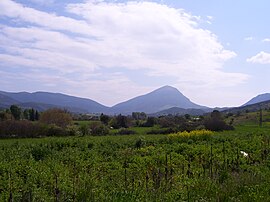Damala
|
Troezen Τροιζήνα |
|
|---|---|

Ortholithi Mountain
|
|
| Coordinates: 37°29′N 23°21′E / 37.483°N 23.350°ECoordinates: 37°29′N 23°21′E / 37.483°N 23.350°E | |
| Country | Greece |
| Administrative region | Attica |
| Regional unit | Islands |
| Municipality | Troizinia-Methana |
| Districts | 8 |
| • Municipal unit | 190.697 km2 (73.629 sq mi) |
| Elevation | 23 m (75 ft) |
| Population (2011) | |
| • Rural | 673 |
| • Municipal unit | 5,486 |
| • Municipal unit density | 29/km2 (75/sq mi) |
| Time zone | EET (UTC+2) |
| • Summer (DST) | EEST (UTC+3) |
| Postal code | 180 20 |
| Area code(s) | 22980 |
| Website | www.dimos-trizinas.gr |
Troezen (/ˈtriːzən/, homophone of ; Greek: Τροιζήν, modern: Τροιζήνα Troizina) is a small town and a former municipality in the northeastern Peloponnese, Greece on the Argolid Peninsula. Since the 2011 local government reform it is part of the municipality Troizinia-Methana, of which it is a municipal unit. It is part of the Islands regional unit.
Troezen is located southwest of Athens, across the Saronic Gulf, and a few miles south of Methana. The seat of the former municipality (pop. 6,507) was in Galatas. Before 2011, Troizina was part of the former Piraeus Prefecture (in antiquity it was part of Argolis). The municipality had a land area of 190.697 km². Its largest towns and villages are Galatás (pop. 2,195 in 2011), Kalloní (pop. 669), Troizína (pop. 673), Taktikoúpoli (250), Karatzás (287), Dryópi (239), Ágios Geórgios (228), and Agía Eléni (159). There are numerous smaller settlements.
According to Greek mythology, Troezen came into being as a result of two ancient cities, Hyperea and Anthea, being unified by Pittheus, who named the new city in honor of his deceased brother, Troezen.
Troezen was where Aethra, daughter of Pittheus, slept with both Aegeus and Poseidon on the same night and fell pregnant with the great Greek hero Theseus. Before returning to Athens, Aegeus left his sandals and sword under a large boulder in Troezen and requested that when the child was able to prove himself by moving the boulder, he must return the items to his father in Athens; Theseus lifted the boulder when he came of age.
...
Wikipedia


